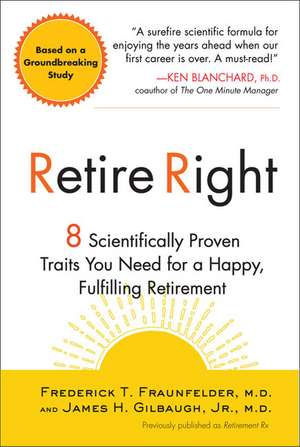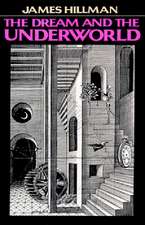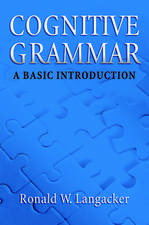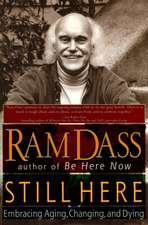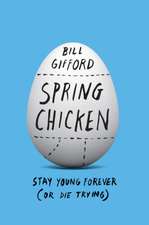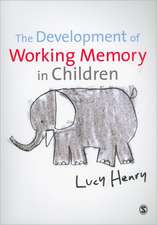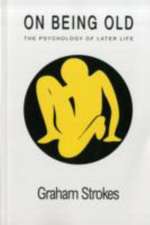Retire Right: 8 Scientifically Proven Traits You Need for a Happy, Fulfilling Retirement
Autor Jr. Fraunfelder, Frederick W., James H. Jr. Gilbaughen Limba Engleză Paperback – 30 apr 2009 – vârsta de la 14 ani
The first scientifically backed guide to a happy, fulfilling retirement.
Over the years, Dr. Fritz Fraunfelder and Dr. Jim Gilbaugh have seen thousands of their patients respond differently to the challenges of retirement: some rose to new heights; others hit new lows. The doctors began to wonder: How do some people maintain their vitality, interests, and zest for life in retirement while others became distant, even depressed? Is there a magic formula for retiring well? To find the answer, they designed a comprehensive study involving more than one thousand patients. The results were surprising but clear. Financial planning is not as important to a fulfilling retirement as many may think-the psychological experience is just as crucial. The happiest retirees shared eight key traits; all of them were able to:
* plan ahead
* maintain a positive attitude
* accept change
* lean on their support network
* have a sense of purpose
* keep a healthy lifestyle
* engage in leisure activities
* enjoy some expression of spirituality
Retire Right evaluates the reader and provides guidelines for how to develop each key characteristic. The good news? These essential skills can be strengthened, even acquired from scratch, whether the reader is just starting to plan for retirement, is in the early years, or is a seasoned retiree. The first scientifically backed bulletproof prescription, this book is the most concrete guide to a happy retirement.
Over the years, Dr. Fritz Fraunfelder and Dr. Jim Gilbaugh have seen thousands of their patients respond differently to the challenges of retirement: some rose to new heights; others hit new lows. The doctors began to wonder: How do some people maintain their vitality, interests, and zest for life in retirement while others became distant, even depressed? Is there a magic formula for retiring well? To find the answer, they designed a comprehensive study involving more than one thousand patients. The results were surprising but clear. Financial planning is not as important to a fulfilling retirement as many may think-the psychological experience is just as crucial. The happiest retirees shared eight key traits; all of them were able to:
* plan ahead
* maintain a positive attitude
* accept change
* lean on their support network
* have a sense of purpose
* keep a healthy lifestyle
* engage in leisure activities
* enjoy some expression of spirituality
Retire Right evaluates the reader and provides guidelines for how to develop each key characteristic. The good news? These essential skills can be strengthened, even acquired from scratch, whether the reader is just starting to plan for retirement, is in the early years, or is a seasoned retiree. The first scientifically backed bulletproof prescription, this book is the most concrete guide to a happy retirement.
Preț: 131.75 lei
Nou
Puncte Express: 198
Preț estimativ în valută:
25.21€ • 26.39$ • 20.98£
25.21€ • 26.39$ • 20.98£
Carte disponibilă
Livrare economică 10-24 martie
Preluare comenzi: 021 569.72.76
Specificații
ISBN-13: 9781583333464
ISBN-10: 1583333460
Pagini: 192
Dimensiuni: 150 x 226 x 15 mm
Greutate: 0.23 kg
Editura: Avery Publishing Group
ISBN-10: 1583333460
Pagini: 192
Dimensiuni: 150 x 226 x 15 mm
Greutate: 0.23 kg
Editura: Avery Publishing Group
Notă biografică
Frederick T. Fraunfelder, M.D. is a physician specializing in ophthalmology with more than 30 years of clinical experience. Dr. Fraunfelder has authored many articles in journals such as the New England Journal of Medicine and the Journal of the American Medical Association. He lectures across the country and internationally and lives in Portland, Oregon.
James H. Gilbaugh Jr., M.D. is a urologist, a fellow of the American College of Surgeons, and the author of Men’s Private Parts. He has appeared on CBS This Morning, CNBC, and ABC News, and he lives in Portland, Oregon.
James H. Gilbaugh Jr., M.D. is a urologist, a fellow of the American College of Surgeons, and the author of Men’s Private Parts. He has appeared on CBS This Morning, CNBC, and ABC News, and he lives in Portland, Oregon.
Extras
INTRODUCTION: HURRY UP, YOUR LIFE IS WAITING
As doctors with subspecialties in geriatrics, we have seen many patients on the brink of, just starting, or deeply into their retirement years. Their widely varied responses to this time and its challenges are remarkable. Some rise to new heights, whereas others seem ready to heave a heavy sigh, sag into a rocking chair, and settle in for good. For instance, one patient, Joanne, a recently retired real estate agent, told us her postߝwork life remained the same as it was while she was selling property. The only real difference was the gift of time that retirement had given her. She was now able to indulge in a midmorning haircut or spa treatment, linger over lunch, spend extra time browsing in the library or bookstore, or take her grandchildren or just herself to an afternoon matinee, all activities that she previously had time only for in the evening or on weekends. She considered this luxury truly golden.
When we compared Joanne’s outlook to that of another patient, Brian, a man who had enjoyed a successful advertising career, we saw a dramatic difference. He could find little to enjoy about his retirement and went so far as to say that he had lost much of the pleasure of living! Even leisure activities that, as a working person, he had enjoyed participating in with his wife now held little interest for him, including dinner parties, cribbage competitions, or simply discussing current events with his spouse. Some of his withdrawal, Brian admitted, came from his increasing forgetfulness, which both scared and embarrassed him. But what bothered him most of all was spending so much time by himself—a situation he had rarely found himself in when he worked. Still, he lacked the will and the gumption to get out and get on with his life. He felt lost and without direction.
What makes one person embrace the second half of life, while another seems only capable of withdrawing from it? Why did some of our patients manage to maintain the vitality that had marked their working years while others failed to make the transition? We wanted to find some information about happy retirees that would assist our patients who were finding retirement a rough go. Exploring bookstores, libraries, and the Internet, we were relentless in our search for retirement advice. Most books we found focused on financial planning, and those that didn’t were anecdotal—filled with standard recommendations to eat well, get enough sleep, and exercise. Good suggestions but too general and unscientific for our needs.
The search continued in our own practices: we began to look at our patients to identify with clinical certainty the skills, habits, and characteristics associated with people who experienced what we observed to be productive, well-adjusted, or “successful” retirements, which we define as richly endowed with good health, loving relationships, outside interests, and, most important, the resilience and wisdom to graciously accept the inevitable, which is loss—of family, friends, loved ones, health, memory, and, ultimately, life.
We wanted to collect accurate data, so we created and conducted a professionally designed survey. More than fifteen hundred of our patients were asked to anonymously fill out what we had come to call The Retirement Docs’ Survey. It was the first time that a survey such as this had centered on retired people and their insights. The questionnaire consisted of multiple choice and essay questions, which took anywhere from an hour to an hour and a half to complete. The return rate was an unheard-of 72 percent. Our respondents replied candidly and often at length—their essays running the gamut from succinctly matter-of-fact to lengthy and deeply emotional, from warmly positive to grimly negative.
As you can imagine, we had amassed a tremendous amount of original research and strong data. We used well-established, controlled research and analysis methods to study the results, including assistance from a local university’s gerontology statistics department. After our first look at what we had gathered, we realized that retirement success is not related to gender, marital status, children, hobbies, or grandchildren. Highly successful retirees come from all walks of life, from stay-at-home moms to corporate leaders, from astronauts to cab drivers, from people forced to retire because of office politics or poor health to those who couldn’t walk away from the nine-to-five treadmill.
From the initial sorting, the statisticians identified four distinct phases of retirement, and nearly eighty traits that successful retirees shared. Those findings were then further distilled, which led us to identify eight specific traits that had the greatest statistical significance and were shared by all of the top 20 percent respondents in the Retirement Docs’ Survey. The four phases and the eight traits of highly successful retirees are the backbone of Retirement Rx. Helping you identify and use the traits you already possess and showing you how to develop those you may lack is the purpose of this book. It’s the kind of “retirement investment” that pays dividends socially, intellectually, and physically.
As doctors with subspecialties in geriatrics, we have seen many patients on the brink of, just starting, or deeply into their retirement years. Their widely varied responses to this time and its challenges are remarkable. Some rise to new heights, whereas others seem ready to heave a heavy sigh, sag into a rocking chair, and settle in for good. For instance, one patient, Joanne, a recently retired real estate agent, told us her postߝwork life remained the same as it was while she was selling property. The only real difference was the gift of time that retirement had given her. She was now able to indulge in a midmorning haircut or spa treatment, linger over lunch, spend extra time browsing in the library or bookstore, or take her grandchildren or just herself to an afternoon matinee, all activities that she previously had time only for in the evening or on weekends. She considered this luxury truly golden.
When we compared Joanne’s outlook to that of another patient, Brian, a man who had enjoyed a successful advertising career, we saw a dramatic difference. He could find little to enjoy about his retirement and went so far as to say that he had lost much of the pleasure of living! Even leisure activities that, as a working person, he had enjoyed participating in with his wife now held little interest for him, including dinner parties, cribbage competitions, or simply discussing current events with his spouse. Some of his withdrawal, Brian admitted, came from his increasing forgetfulness, which both scared and embarrassed him. But what bothered him most of all was spending so much time by himself—a situation he had rarely found himself in when he worked. Still, he lacked the will and the gumption to get out and get on with his life. He felt lost and without direction.
What makes one person embrace the second half of life, while another seems only capable of withdrawing from it? Why did some of our patients manage to maintain the vitality that had marked their working years while others failed to make the transition? We wanted to find some information about happy retirees that would assist our patients who were finding retirement a rough go. Exploring bookstores, libraries, and the Internet, we were relentless in our search for retirement advice. Most books we found focused on financial planning, and those that didn’t were anecdotal—filled with standard recommendations to eat well, get enough sleep, and exercise. Good suggestions but too general and unscientific for our needs.
The search continued in our own practices: we began to look at our patients to identify with clinical certainty the skills, habits, and characteristics associated with people who experienced what we observed to be productive, well-adjusted, or “successful” retirements, which we define as richly endowed with good health, loving relationships, outside interests, and, most important, the resilience and wisdom to graciously accept the inevitable, which is loss—of family, friends, loved ones, health, memory, and, ultimately, life.
We wanted to collect accurate data, so we created and conducted a professionally designed survey. More than fifteen hundred of our patients were asked to anonymously fill out what we had come to call The Retirement Docs’ Survey. It was the first time that a survey such as this had centered on retired people and their insights. The questionnaire consisted of multiple choice and essay questions, which took anywhere from an hour to an hour and a half to complete. The return rate was an unheard-of 72 percent. Our respondents replied candidly and often at length—their essays running the gamut from succinctly matter-of-fact to lengthy and deeply emotional, from warmly positive to grimly negative.
As you can imagine, we had amassed a tremendous amount of original research and strong data. We used well-established, controlled research and analysis methods to study the results, including assistance from a local university’s gerontology statistics department. After our first look at what we had gathered, we realized that retirement success is not related to gender, marital status, children, hobbies, or grandchildren. Highly successful retirees come from all walks of life, from stay-at-home moms to corporate leaders, from astronauts to cab drivers, from people forced to retire because of office politics or poor health to those who couldn’t walk away from the nine-to-five treadmill.
From the initial sorting, the statisticians identified four distinct phases of retirement, and nearly eighty traits that successful retirees shared. Those findings were then further distilled, which led us to identify eight specific traits that had the greatest statistical significance and were shared by all of the top 20 percent respondents in the Retirement Docs’ Survey. The four phases and the eight traits of highly successful retirees are the backbone of Retirement Rx. Helping you identify and use the traits you already possess and showing you how to develop those you may lack is the purpose of this book. It’s the kind of “retirement investment” that pays dividends socially, intellectually, and physically.
